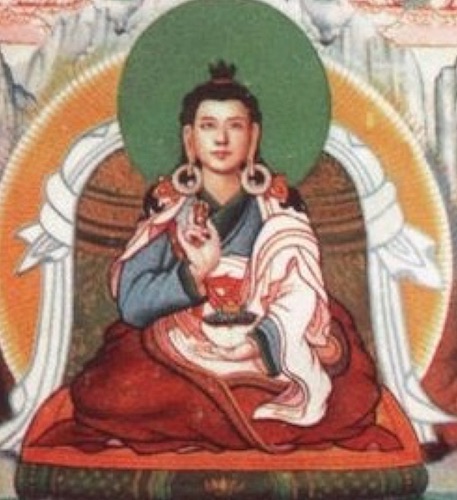|
Advice on Abandoning the Eight Worldly Concerns By Nyakla Pema Dündul |
|
༄༅། [PD8W-T] །འཇིག་རྟེན་ཆོས་བརྒྱད་སྤོང་བའི་གདམས་པ། །
Advice on Abandoning the Eight Worldly Concerns
by Nyala Pema Dündul
༄༅། །འཇིག་རྟེན་ཆོས་བརྒྱད་སྤོང་བའི་གདམས་པ་ནི།
[PD8W-1] ཨ་ཧོ། སྐལ་ལྡན་ལས་ཅན་སྐྱེས་མཆོག་རྣམས་ཀྱིས་གསོན།
A ho! Listen well, all you fortunate, supreme disciples of excellent karma!
[PD8W-2] །རྙེད་དང་མ་རྙེད་བདེ་དང་མི་བདེ་བའི། །སྙན་དང་མི་སྙན་བསྟོད་དང་མ་བསྟོད་བཞི། །དེ་ལ་འཇིག་རྟེན་ཆོས་བརྒྱད་ཟེར་བ་ཡིན།
Gain and loss, happiness and unhappiness,
Fame and insignificance, praise and blame—
These are what we call "the eight worldly concerns."
[PD8W-3] །བཟང་ངན་གཉིས་འཛིན་དགའ་སྡུག་ཅན་དེ་ལ། །གཉིས་མེད་རང་གྲོལ་བྱ་བའི་མིང་ཡང་མེད། །ཆོས་བརྒྱད་ཞེན་པའི་སྒྲོག་གིས་འཆིང་བ་ཡིན།
Those who cling to the duality of good and bad, and feel pleasure and frustration,
Can't even be called practitioners of non-dual self-liberation,
Bound as they are by the chains of attachment to the eight worldly concerns.
[PD8W-4] །བཟང་ངན་དགའ་སྡུག་རྣམ་པ་ཅི་བྱུང་ཡང་། །སྒྱུ་མའི་དཔེ་བཅུ་བཞིན་དུ་ཤེས་པར་གྱིས། །སྨྲ་བསམ་བརྗོད་བྲལ་བློ་འདས་རྫོགས་པའི་ངང་། །རེ་དོགས་མཐའ་བྲལ་ལྟ་བའི་ཀློང་དུ་ཞོག །ཅེས།
Whatever happens, whether it appears good or bad, pleasurable or painful,
Is just like the ten similes of illusion — recognise this!
And, in a state of perfection, transcending the ordinary mind, and beyond words, thought and description,
Rest in the expanse of the view, beyond the limitations of hope and fear.
[PD8W-5] འཇིག་རྟེན་ཆོས་བརྒྱད་སྤོང་བའི་གདམས་པ་འདི། །སློབ་མའི་ཚོགས་ཀྱིས་ཡང་ཡང་བསྐུལ་བའི་ངོར། །སྤྲང་རྒན་པདྨའི་མིང་གིས་བཀོད་པ་ཡིས།
This advice on abandoning the eight worldly concerns,
Was put together by the old beggar Padma,
For a group of students who had repeatedly requested it.
[PD8W-D] །རྗེས་འཇུག་བྱང་ཆུབ་བསྒྲུབ་པའི་རྣལ་འབྱོར་ལ། །འཇིག་རྟེན་ཆོས་བརྒྱད་བདུད་ཀྱིས་བསླུ་བ་དེ། །ཡིད་ལ་དྲན་པ་ཙམ་ཡང་མེད་པར་ཤོག
Through this, may my followers, yogis intent upon enlightenment,
Be free from even so much as a single thought
That is deceived by the māra of the eight worldly concerns!
| Translated by Gyurme Avertin and Adam Pearcey, Rigpa Translations, 2013.
